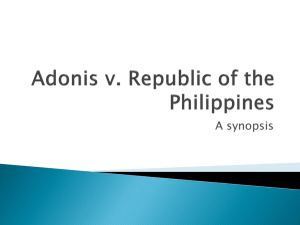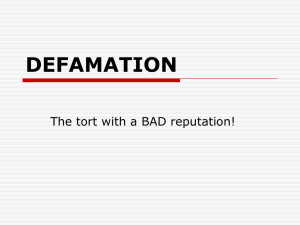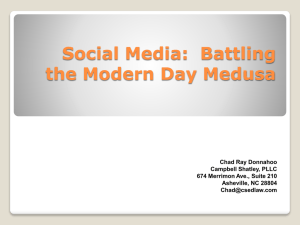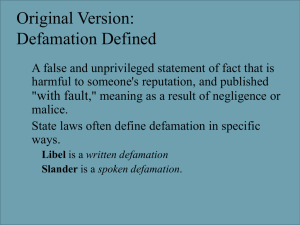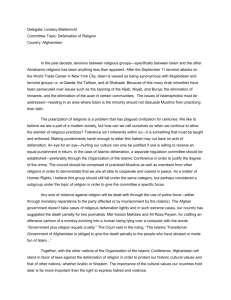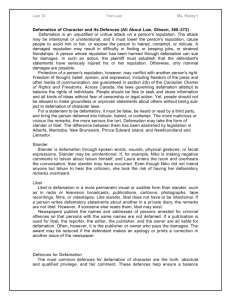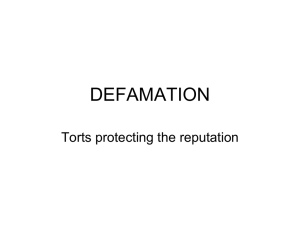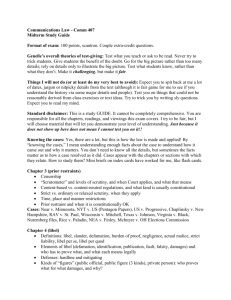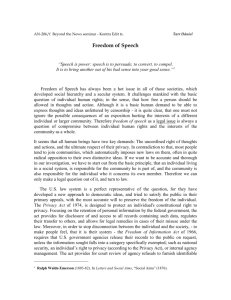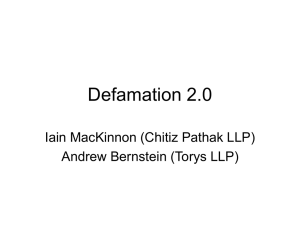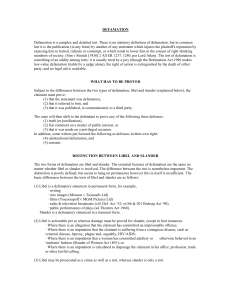Law Response 6 Defamation
advertisement
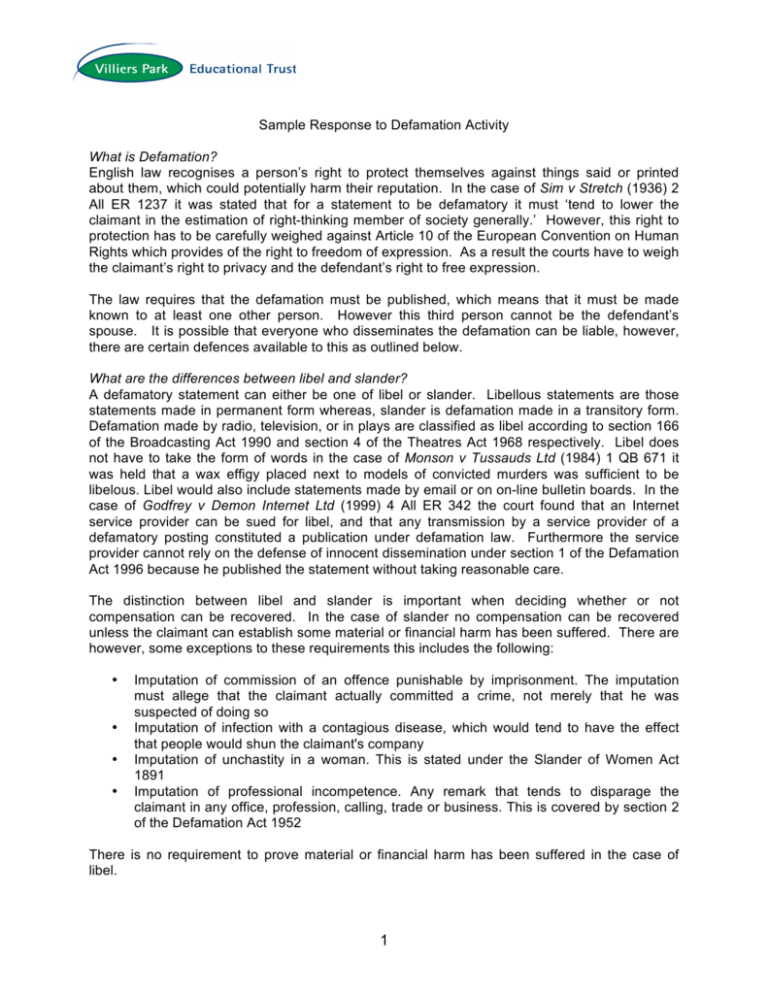
Sample Response to Defamation Activity What is Defamation? English law recognises a person’s right to protect themselves against things said or printed about them, which could potentially harm their reputation. In the case of Sim v Stretch (1936) 2 All ER 1237 it was stated that for a statement to be defamatory it must ‘tend to lower the claimant in the estimation of right-thinking member of society generally.’ However, this right to protection has to be carefully weighed against Article 10 of the European Convention on Human Rights which provides of the right to freedom of expression. As a result the courts have to weigh the claimant’s right to privacy and the defendant’s right to free expression. The law requires that the defamation must be published, which means that it must be made known to at least one other person. However this third person cannot be the defendant’s spouse. It is possible that everyone who disseminates the defamation can be liable, however, there are certain defences available to this as outlined below. What are the differences between libel and slander? A defamatory statement can either be one of libel or slander. Libellous statements are those statements made in permanent form whereas, slander is defamation made in a transitory form. Defamation made by radio, television, or in plays are classified as libel according to section 166 of the Broadcasting Act 1990 and section 4 of the Theatres Act 1968 respectively. Libel does not have to take the form of words in the case of Monson v Tussauds Ltd (1984) 1 QB 671 it was held that a wax effigy placed next to models of convicted murders was sufficient to be libelous. Libel would also include statements made by email or on on-line bulletin boards. In the case of Godfrey v Demon Internet Ltd (1999) 4 All ER 342 the court found that an Internet service provider can be sued for libel, and that any transmission by a service provider of a defamatory posting constituted a publication under defamation law. Furthermore the service provider cannot rely on the defense of innocent dissemination under section 1 of the Defamation Act 1996 because he published the statement without taking reasonable care. The distinction between libel and slander is important when deciding whether or not compensation can be recovered. In the case of slander no compensation can be recovered unless the claimant can establish some material or financial harm has been suffered. There are however, some exceptions to these requirements this includes the following: • • • • Imputation of commission of an offence punishable by imprisonment. The imputation must allege that the claimant actually committed a crime, not merely that he was suspected of doing so Imputation of infection with a contagious disease, which would tend to have the effect that people would shun the claimant's company Imputation of unchastity in a woman. This is stated under the Slander of Women Act 1891 Imputation of professional incompetence. Any remark that tends to disparage the claimant in any office, profession, calling, trade or business. This is covered by section 2 of the Defamation Act 1952 There is no requirement to prove material or financial harm has been suffered in the case of libel. 1 Who bears the burden of proving the alleged defamation? The burden of proof lies with the defendant - this is unique to English law, in libel cases the burden of proof lies with the author or publisher and not the claimant. In other words, you have to prove that what you write is true. The person you have targeted does not have to prove that you are wrong. What are the defences available? There are several defences to a claim of defamation. These include: • • • • • Truth is available as a complete defense to a claim of defamation. This is sometimes referred to as justification. The claim may still be successful if it is only partially true. However, under the Rehabilitation of Offenders Act 1974 the truth is no defence where the defendant makes a malicious defamatory reference to a spent conviction, even if it is true. Absolute Privilege is available to Parliamentary and judicial proceedings. Such statements will be completely exempt from a claim of defamation. Qualified Privilege will apply to exempt statement made unless the claimant can prove the comments were made with malice. The statutory provisions fall under section 15 of the Defamation Act 1996, where there are two groups. The first group in Schedule 1 of the Act, are statements having ‘qualified privilege without explanation or contradiction,’ most importantly: fair and accurate reports of the proceedings of legislatures, courts and governmental inquiries; and fair and accurate copies of material published by or on the authority of any governmental, legislature and international organisation anywhere in the world. The second group in Schedule 2 of the Act is described as ‘privileged subject to explanation or contradiction.’ This paragraph includes police functions and governmental functions. Fair comment will apply to matters of public interest it is designed to preserve the fundamental rights of freedom of speech and expression. It is presumed everyone is entitled to express genuinely held opinions on matters of public interest however strong those views may be. The defendant must establish the following: the statement must be an opinion and not a statement of fact; the comment must have a sufficient factual basis; the comment must be one that a "fair minded" man could honestly hold; the subject matter of the comment must be a matter of public interest. Apology or offer to make amends is available under sections 2-4 of the Defamation Act 1996. This can include an offer to publish a correction and pay compensation. Although section 1 of the Defamation Act 1996 protects those who have only secondary responsibility they must demonstrate that they have taken sufficient care to rely on the defence, and show that he is not the author, editor or publisher of the statement. What are the remedies available? Damages are the most common remedy for defamation. Special damages compensate the claimant for actual financial loss. General damages compensate the claimant for the damage to his or her reputation. General damages can take the form of compensatory, aggravated and exemplary damages. Exemplary (or punitive) damages can be awarded where the defendant publishes the defamatory matter because the prospects of material advantage to him outweighed the prospects of material loss. Injunctions can also be granted in exceptional circumstances usually where is no question that the statement is untrue. Who bears the cost of the claim? Claims for defamation can only be made in the High Court. Publicly funded legal services are not normally available for making a claim of defamation. This means that claimants would have to fund the claim themselves. Claims for defamation are very costly. However, some law firms offer no win no fee agreements for these cases. 2 Cases of Defamation In one case involving a claim in defamation for slander, Brian Maccaba accused Rabbi Dayan Yaakov Lichtenstein of spreading "poisonous" claims he was a ‘sexual predator’ and ‘serial adulterer.’ After nearly 32 hours of deliberations, the London High Court jury returned 10-1 verdicts against Mr Maccaba. The defence argued that Maccaba offered family friend Alain Attar £550,000 for his wife Nathalie and sexually harassed her twice. Maccaba will now have to pay over £2 million in costs. See: http://news.bbc.co.uk/1/hi/uk/3839759.stm In another case involving a claim for libel Sharon Osbourne sued The Sun for printing that she was ‘driving her frail husband Ozzy Osbourne to destruction’ and was working him ‘so hard she will kill him.’ Her lawyers argued that the publication had caused damage to her personal and professional reputation and she had suffered considerable embarrassment and distress. The Sun offered an apology and a substantial, undisclosed sum of money, stating that the allegations were untrue and ought never to have been published. See: http://news.bbc.co.uk/1/hi/entertainment/7830495.stm Another high profile libel case involved former Tory MP Neil Hamilton in his claim against Harrods boss Mohamed Al Fayed. Mr Fayed in a Dispatches documentary broadcast on Channel 4 in 1997 claimed that the former MP had demanded and received thousands of pounds in cash, Harrods gift vouchers and hospitality at the Ritz hotel in Paris, in return for parliamentary services. Hamilton lost his appeal and was left with an estimated £2m legal bill. See: http://www.guardian.co.uk/uk/2000/dec/21/hamiltonvalfayed Extension Activity The German media enjoys constitutional freedom of expression, which limits the effect of libel claims against them. French law recognises six types of defamation: allegations or imputations, falsifying specific and precise facts, attacks to honour or reputation, identification of particular individuals, publication, and bad faith. 3
